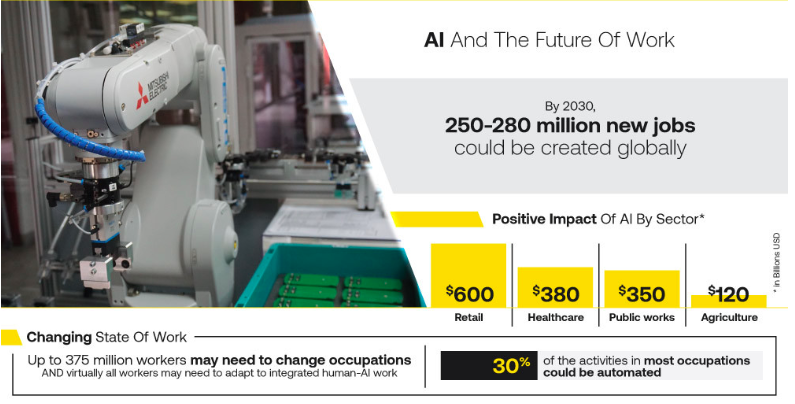In today’s fast-paced business world, efficiency, and productivity are two vital factors that determine the success of a small business. However, with limited resources and manpower, achieving optimal efficiency and productivity can be arduous for small businesses. The advent of Artificial Intelligence (AI) technology has significantly transformed the business landscape by providing innovative solutions to streamline processes, reduce costs, and enhance customer experience. One such solution is AI-powered automation.
AI-powered automation refers to using intelligent machines and algorithms to automate repetitive tasks and processes previously performed manually by humans. By leveraging Machine Learning (ML), Natural Language Processing (NLP), Robotics Process Automation (RPA), and other AI technologies, small businesses can automate a wide range of activities, including data entry, invoice processing, HR management, customer service, marketing campaigns, and more.
The benefits of AI-powered automation are multifaceted. First and foremost, it enables small businesses to save time and resources by automating repetitive tasks that would otherwise consume a considerable amount of time if done manually. This allows employees to focus on more critical tasks that require human expertise while reducing the risk of errors and increasing accuracy.
Another significant advantage of AI-powered automation is cost reduction. Small businesses can lower labor costs, reduce overheads, and optimize operational efficiency by automating routine tasks. This not only enables small companies to operate with greater agility and flexibility but also provides a competitive advantage over larger enterprises with more substantial resources.
Moreover, AI-powered automation is also transforming the stock market industry. Many financial institutions and investors are leveraging AI to analyze vast amounts of data in real time, identifying patterns and predicting market trends more accurately. This enables investors to make more informed investment decisions, leading to potentially higher returns and reduced risks.
However, concerns are also associated with using AI-powered automation in the stock market. The rapid growth of algorithmic trading has led to fears of market volatility and potential market manipulation. It is crucial to ensure that these technologies are used ethically and responsibly, with proper regulation and oversight, to prevent unintended consequences.
Furthermore, AI-powered automation can significantly enhance productivity by speeding up workflows, improving collaboration, and optimizing resource allocation. For instance, in HR management, automated systems can help with recruitment processes by screening resumes through NLP tools powered with keyword identification capabilities. Similarly, in customer service sectors where chatbots can quickly answer customers’ generic questions, freeing up agents’ time for more complex issues. As an applicant, you’ll want to learn how to boost your resume.
Moreover., AI-based automation also helps small businesses gain insights into their operations through data analytics while additionally offering forecasts on future trends and identifying any possible shortfalls or erroneous trends via Big Data Analytics platforms like Microsoft’s PowerBi.
How AI-powered automation revolutionizes small businesses: Streamlining processes, reducing costs, and enhancing customer experience.
Small businesses can always use an edge in productivity and efficiency. The challenge is finding technologies that are affordable, accessible, and effective. Artificial intelligence (AI) – a driver of automation – could be the technology small businesses need to streamline their processes, reduce costs and increase their bottom line.
According to a survey by Sage, 23% of small and medium-sized enterprises (SMEs) already incorporate AI into their operations. Out of those using this technology, 82% reported increased efficiency in their day-to-day operations.
Automation is one way in which companies can harness the power of AI. Automation eliminates repetitive tasks that may slow operations, freeing up employee time for higher-value activities like problem-solving or customer engagement.
But it’s not just about replacing human involvement with machines—AI-powered automation aims to create more efficient workflows for employees. With AI handling mundane tasks like data entry or scheduling appointments, employees can focus on more creative outputs or customer interactions.
One example where AI-powered automation has proven successful is in the medical field. Health provider Kaiser Permanente uses bots to populate electronic health records with patients’ test results and vitals, reducing processing time and errors and enabling doctors to provide faster diagnoses.
Another example comes from CFOs who manage expense reporting – traditionally one of the company’s most tedious finance tasks. Concur Expense from SAP significantly reduces the effort expended on expense reporting by automating this process, which allows employees flexibility while granting management complete visibility into spending across departments.
How can AI-powered automation help small businesses streamline operations and boost profitability?
The benefits don’t stop there – by leveraging advanced technologies such as machine learning algorithms that analyze vast data patterns to refine recommendations over time, SME leaders can increase sales by identifying opportunities that would have otherwise gone unnoticed due to information overload.
Another benefit? Automating back-office processes also helps free up finances for growth-related investments previously directed toward payroll or other labor costs. This ultimately leads to an increased level of competitiveness and profitability.
AI-powered automation is a powerful tool for small businesses looking to join or remain competitive in their respective industries. As AI technology evolves, companies that invest in it will be able to spend more time on what truly matters: developing new products, seeking out new customers, and simply improving their bottom line.
Conclusion:
AI-powered automation is a game-changer for small businesses, providing innovative solutions to streamline processes, reduce costs, and enhance customer experience. Using AI in the stock market also presents new opportunities for investors to make informed investment decisions. However, balancing these opportunities with ethical considerations is essential to ensure the long-term sustainability of both small businesses and the stock market.
In conclusion, Automating processes using AI technologies has rapidly become an unbeatable revolution ushering in an era where efficiency meets productivity levels. Small businesses can leverage this technology by partnering with reputable AI vendors or developing in-house capabilities to drive innovation, growth, and success in the competitive business landscape.













